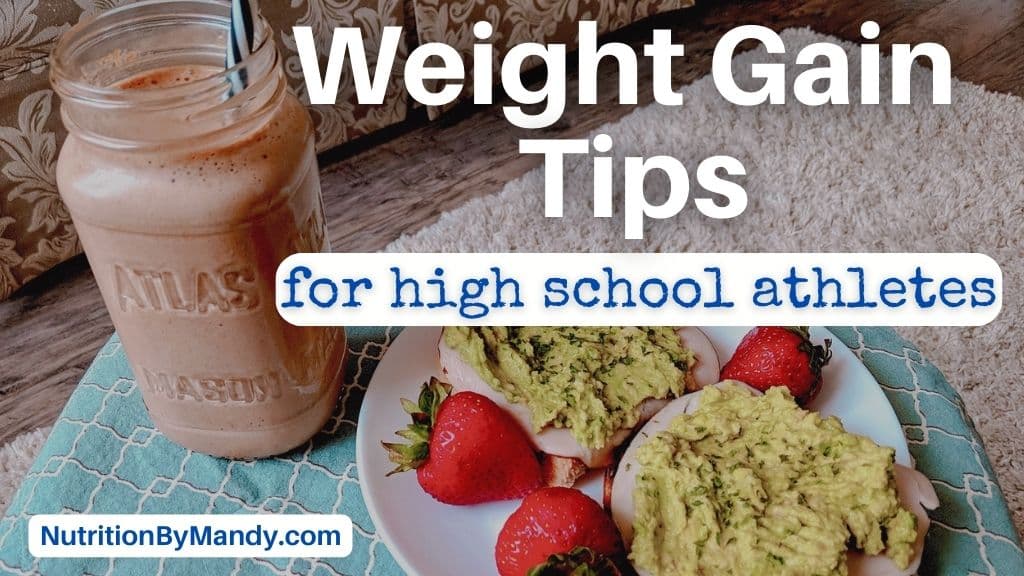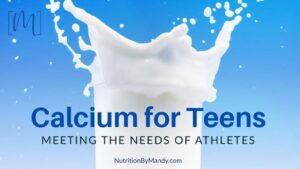Last Updated on August 3, 2025 by Mandy Tyler, M.Ed., RD, CSSD, LD
7 Nutrition Tips to Support Weight Gain in High School Athletes
It is common for high school athletes to desire to gain weight and increase their muscle mass.
However, they are often unaware of how many calories they are burning through both structured physical activity and everyday living, which can make gaining weight a challenge.
If you are a high school athlete struggling with putting on weight, the 7 nutrition tips below can help support your weight gain goals.
Tip 1: Focus on Eating Frequently Throughout the Day
With busy school, sport, and training schedules, it can be easy for high school athletes to forget to eat.
However, just as a high school athlete has a detailed schedule for practice, lifting weights, and cardio activity – it is important to create a scheduled routine for eating.
Plan Ahead to Support Weight Gain in High School Athletes
Plan ahead to allow for three meals and several healthy snacks throughout the day. If you have trouble remembering to eat, consider setting an alarm on your phone as a reminder.
Make sure you stick to your plan on the weekends. Sleeping in and skipping breakfast on the weekend is an easy way to miss out on important nutrition to fuel your day.

Tip 2: Start the Day with Breakfast
Make it a priority to start each day with a healthy breakfast. If you have limited time in the morning, consider packing a grab-and-go breakfast the night before.
Make sure to include a good source of protein with your meal. I find athletes often do a good job of including protein at lunch and dinner, but neglect to include protein at breakfast.
Easy Breakfast Ideas for High School Athletes
Some easy breakfast ideas for teen athletes include:
- Greek yogurt, mixed berries, granola
- Bagel with nut butter and sliced banana, low-fat milk
- Breakfast bars, hard-boiled eggs, grapes
- Protein overnight oats – one of my favorites!
- Breakfast wrap – Whole wheat tortilla, scrambled eggs, turkey sausage, sliced avocado, salsa
Pro Tip: A fruit smoothie can also be a great breakfast and an economical way to add protein, vitamins, and minerals to your performance nutrition diet.
Tip 3: Focus on Quality Snacks to Help High School Athletes Gain Weight
View snacks as an important part of your performance nutrition meal plan. Aim to include a snack between each meal and before bed.
Try to create balanced snacks by combining a food that provides a source of lean protein with a food from at least one other food group.
Snack Ideas for High School Athletes
Easy snack ideas for teen athletes include:
- Apple slices and peanut butter
- Pita chips and hummus
- Beef jerky and pretzels
- Hard-boiled eggs and breakfast bars
- Cottage cheese and pineapple
- String cheese and fig bars
Pack Healthy Snacks to Fuel Your Day
Be intentional about packing healthy snacks to take with you during the day. Don’t let lack of food be an excuse for not eating.
Pack snacks in your backpack, gym bag, locker, the glove box of your car, and desk drawers. Having the right food available at the right time can help keep you on track with your sports nutrition meal plan.

Tip 4: Fuel Your Workouts
High school athletes who desire to gain weight should pay particular attention to what they are eating and drinking surrounding their workouts.
Prior to working out, consume a food that contains a good source of carbohydrates. Carbohydrates provide athletes with the energy they need to perform at their best.
High-carb snack ideas include:
- Fresh fruit
- Dried fruit, fruit leather
- Applesauce squeeze pouch
- Bagels, dry cereal, protein granola
- Pretzels, pita chips, graham crackers
- Granola bars, breakfast bars, fig bars
- Peanut butter & jelly sandwich
Recover After Workouts
Focus on recovery nutrition following your workout by eating a snack or meal that contains protein, carbohydrates, fluid, and electrolytes.
The protein will help build and repair muscle mass, the carbohydrates will refill your energy stores, and the fluid and electrolytes will help you to rehydrate.
A post-workout snack is especially important if it is going to be more than an hour after your workout until you eat your next meal.
Recovery Nutrition Meal and Snack Ideas
Ideas for post-workout snacks and meals include:
- Chocolate milk with granola bars
- Low-fat milk with a peanut butter & jelly sandwich
- Post-workout smoothie
- Turkey and cheese sandwich, pretzels, apple slices, sports drink
- Pasta with lean meat sauce, green beans, fresh sliced fruit, water
- Grilled salmon, broccoli, rice, tart cherry juice
- Chipotle burrito bowl made with chicken, brown rice, black beans, corn salsa, lettuce, tomatoes, and guacamole
- Chick-fil-A: Grilled chicken sandwich, berry parfait, fresh fruit cup
- CAVA bowl with grilled chicken, basmati rice, mixed greens, fresh veggies, pita bread, and hummus
As a reminder, a quality sports nutrition meal plan is only half of the equation when it comes to building muscle mass and gaining weight.
Make sure to complement your sports nutrition meal plan with a well-planned strength training program. Eating right provides the fuel and the strength training program provides the stimulus for muscle growth.
Tip 5: Add Healthy Calories from Beverages
An easy way to add nutritious calories to your day is through what you drink. Aim to drink beverages with your meals that contain healthy calories – whole milk or 100% fruit juice are both great choices.
To avoid filling up on the beverage, eat your meal first and then consume your beverage.
Drinking nutritious beverages with your meals is a simple way to add vitamins, minerals, and calories to your daily intake.
Pro Tip: A high-calorie smoothie can be a great option to support high school athletes with gaining weight. Consider blending in ingredients such as avocado, high-protein milk, and peanut butter to create a nutrient-rich, calorie dense drink.
Tip 6: Support High School Athlete Weight Gain with Calorie Dense Foods
When trying to increase total daily intake, it can be helpful to choose calorie dense foods.
A calorie-dense foods contains a high number of calories relative to its weight. In other words, calorie-dense foods provide a large amount of calories in a small amount of food.
Adding calorie dense foods to your diet is an easy way to provide extra calories and nutrients to your day without filling you up.
Calorie Dense Foods to Support Weight Gain
Examples of calorie dense foods and spreads include:
- Avocados
- Nuts and seeds
- Nut butters
- Granola
- Trail mix
- Dried fruit
- Mayonnaise
- Salad dressing
- Olive oil

Tip 7: End the Day with an Evening Snack
Finally, end the day with a high protein bed-time snack. Capitalizing on a quality evening snack is a key strategy for supporting weigh gain in high school athletes.
I encourage athletes to aim to consume this snack within the hour before going to bed. The evening snack will provide your muscles with the fuel needed to promote recovery during the night.
Ideas for adding protein to your evening snack include:
- Greek yogurt
- Cottage cheese
- High-protein milk
- Kodiak Cakes® Frozen Waffles or Pancakes
Use Caution with Supplements and Weight Gainers
It may be tempting to buy a sports supplement that claims to result in immediate weight gain. However, it is important for athletes to use caution with any supplements they are considering purchasing.
Dietary supplements are not regulated in the same way “conventional” foods are by the United States Food and Drug Administration. Dietary supplements may contain banned substances that could potentially be harmful to an athlete’s health or make the athlete ineligible for competition (1).
Consult with a Sports Dietitian Nutritionist
Athletes should consult with a sports dietitian nutritionist prior to taking any dietary supplement. The sports dietitian nutritionist for athletes can review dietary supplements and provide guidance on the safety and efficacy of sports supplements.
Athletes should also keep in in mind that there are numerous ways they can boost the calorie and protein content of their shakes with real food items. For ideas, check out my blog on protein shakes for teenage athletes.

7 Nutrition Tips to Support Weight Gain in High School Athletes
You now have 7 sports nutrition strategies to utilize to support weight gain in high school athletes – get started today!
For additional nutrition strategies for high school athletes, check out my blog on protein for teenage athletes.
Join the Nutrition By Mandy Email List & Get a Free High Calorie Smoothie Recipe
Click HERE to join the Nutrition By Mandy e-mail list. When you join you will receive a free high calorie smoothie recipe to download and enjoy.
About the Author
Mandy Tyler is a Sports Dietitian Nutritionist in the San Antonio, TX area. She is a Registered and Licensed Dietitian, a Board-Certified Specialist in Sports Dietetics, a Licensed Athletic Trainer, and is a Certified Exercise Physiologist through the American College of Sports Medicine. Mandy has experience working with athletes at the high school, collegiate, and professional levels. She believes the key to reaching one’s full potential, both in everyday life and in sports performance, relies on a healthy nutritional foundation.

If you are looking to take your performance to the next level, make sure to check out my new Sports Nutrition Game Day Guide. This downloadable guide is written to help athletes develop an individualized plan to achieve peak performance on game day.





